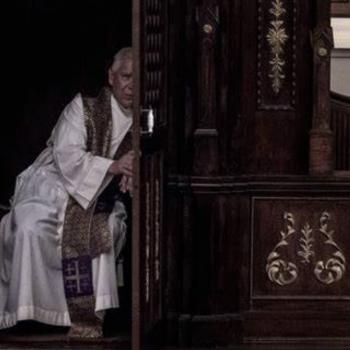In anticipation of the 50th anniversary of Humanae Vitae this summer, Sick Pilgrim will be featuring a series of essays on Natural Family Planning, the only acceptable method of achieving or avoiding pregnancy according to the teaching of the Catholic Church. These essays will not present ideological stances or theological arguments, but will simply offer unvarnished testimony from individuals who have used NFP. The struggles and sufferings that NFP carries with it frequently go undiscussed, and we wanted to offer a space for honest conversation. The essays are being posted anonymously to protect the privacy of the writers, who otherwise might not feel comfortable telling their stories. When it comes to NFP, “all things conspire to keep silent…half out of shame perhaps, half as unutterable hope” (Rainer Maria Rilke). We want NFP to work, and when it doesn’t, we keep silent and believe our struggles are unique. It is the hope of the editors of Sick Pilgrim that these essays will be a source of hope to those who struggle with NFP, and will convey the message: You are not alone.
***
I wrote our pastor an email with a subject line that read, “Existential Crisis.”
I didn’t know how else to characterize our situation. My husband and I had both gone to an extremely conservative Catholic college and took the Church’s laws seriously. We’d been taught that Catholic doctrine, especially in the realm of “faith and morals,” came directly from the mind of God and passed sacrosanct into the hands of the pope. It was infallible and ultimately for our good.
We followed the rules. Sure, we did it out of fear to some degree, but we also followed them out of trust and love. We were both virgins until we got married, and I tried my best to learn how to do NFP accurately within our marriage (in spite of my terrible math skills and complete lack of stable schedule, meaning my sleep patterns were all over the place). We wanted our life together to center around Christ, and took seriously that that meant going in wholesale on the entire Church package.
Sure, we were scared when I realized I was pregnant, totally unprepared. We were both still in grad school, and I’d grown up an only child—it’s not too much of a stretch to say I knew literally nothing about babies. Looking at the faint pink line on the stick, I knew I should be grateful—new life is a gift, and I had a loving husband who I knew would be supportive (emotionally, at least—neither one of us was in a reasonable position to financially support our book collection, much less a baby). Still, I had more than many women did in the throes of an unexpected pregnancy.
But it wasn’t enough. When our baby girl came, she did all the things mothers are promised when a baby comes into the world: she softened me, changed my priorities, opened up new vantage points through which to view life. She immediately became the most important and most treasured being in the world.
Still, I couldn’t shake my memory from high school economics class, the day we learned about the theory of diminishing returns. There’s only so much risk you can take, so much energy you can expend, and expect a positive outcome. At a certain point, it can all become too much. There’s a point where risk can turn catastrophic, and you lose all you’ve invested.
I love my baby girl, and I rejoice every day that she came into this world. But was I ready for her? No way. I wanted to be steady, to be open and healthy in my own skin before bringing a vulnerable human into this world. When she entered our lives, my husband and I were in graduate programs in the humanities, working odd jobs and trying desperately to learn how to live in healthy relationship as adults. Hell, let’s be honest: I was still learning how to boil water. It was a rough ride.
But I loved learning how to be a mother. Every night, as our baby would wake up every two hours needing to nurse, I would sit up in bed and read my books about breastfeeding and organic baby purees. I wanted to do this right, inasmuch as that was possible. But I could also tell that I was close to the edge. I wasn’t just tired. My hormones spilled all over everyone; I felt constantly overwhelmed, and sometimes I would have to set the baby down to make absolutely sure that I wouldn’t do something I would regret. With every fiber in my being I didn’t want to hurt her, and I knew that I was often not in my right mind. I maintained a delicate balance, and I knew it.
I’d heard of several women who had gone to our college who had had “Irish twins,” that oh-so-Catholic phenomenon of hoping breastfeeding works as birth control, and ending up with one baby in the beginning of the year, and another baby at the end. I knew I couldn’t do that. I would break. Not to mention the fact that we had so little money, we could barely afford a bassinet for this one baby. The choice to breastfeed was largely borne out of a desire to honor the wisdom of the body, but that was not the only reason. Feeding a human life for a full six months for free, simply on what my body already produced, felt both necessary and miraculous. As if by magic, milk would appear just when our baby needed it. It was like manna in the desert—just enough, and the perfect food for wholesome sustenance.
I scoured my NFP books, different texts from different traditions, and my breastfeeding books. I re-read the encyclicals dealing with marriage and openness to life, Humanae Vitae, Evangelium Vitae, Casti Connubii, even. Nothing. There was nothing on how to practice NFP while breastfeeding.
NFP, as any woman who’s tried it knows, is predicated upon being able to read the signs (specifically the mucosal signs, but also sometimes body temperature), produced by your body throughout the course of your menstrual cycle. Having an unpredictable (or non-existent) cycle, such as happens after giving birth and breastfeeding, means there are no signs, at least none such as are described in the NFP books. And while our encyclicals will tell us repeatedly that using artificial birth control offends the natural order of things, they offer no guidance on how to work within the natural order, especially when one has just given birth.
So there I was, faced with the reality that if I were to follow the natural order of my body and continue to breastfeed, I would either have to stay away from my husband and his body, or risk pregnancy, which was both dangerous for me subjectively, based on my mental and financial instability, and dangerous for a woman in general at that stage post-partum, when the body has not yet fully healed.
But I wanted to be a “good” Catholic, a Catholic who practiced everything. So my husband and I decided to stay away from each other for about four months. No kissing, no touching (since kissing can turn into so much more, and we didn’t want to be “occasions of sin” for each other).
Predictably, the lack of physical intimacy took its toll. When you get married, you become one flesh. You are knitted together in a dynamic way that takes practice to continue to grow in a healthy and organic way. Our complete lack of touch started to feel as though we were moving away from one another on every other level, too. My conscience told me that such a dissolution of unity could not be of God. I knew the Church’s teaching on sexuality, that sexuality is meant to bear both unitive and procreative fruits. We had achieved the procreation, but our unity started to slip away. It wasn’t that we were desperate for sex. We thirsted for one another, especially during those trying first months of nurturing a new baby.
Beyond my sneaking suspicion that God desired for me to experience intimacy with my husband, I started to realize that if God made us (and I believe he did), then he would know a woman’s biology. And if he made us to have babies, and allowed our breasts to produce milk to feed those babies, then he would know all about the biological ramifications of our breasts making that milk, that we would cease to produce the signs that make NFP possible.
And so I had to acknowledge what was in front of me: if the encyclicals, which I had been taught to revere as coming from the mouth of God, knew nothing about a woman’s biology and the limits to “natural” birth control, then the encyclicals could not, in fact, come straight from God. I refused to believe that the Holy Spirit knows less about biology than I do.
Hence the email to our pastor with the dire subject line. This was a real testing ground for me: was I going to hold on to the letter of the law for dear life, knowing it might cause a mental breakdown for my mind, a physical breakdown for my body, and a complete impoverishment of our family if I got pregnant? Or was I going to let go of my fear of a rigid, even vengeful God, and choose to believe that God really wants my good, and the good of my family? Could I believe that I could listen to my conscience, and that my reason and desires were given to me by God?
It was wrenching to have to let go of my “Certainty Catholicism,” to let in a God of mystery and process. I mourned the loss of belief in the infallibility of papal encyclicals and complete hierarchical authority.
But I began to know a God of liberation and gentleness, a God who acknowledges limits, and loves me anyway. I allowed myself to hear that I was the “beloved,” in whom he was well pleased, whether or not I stayed away from “artificial birth control.”
And the first night we used a condom, I knew what it meant give myself wholly to my husband and to my God, without fear.
The essays in Sick Pilgrim’s You Are Not Alone series are written anonymously by Catholic women and curated by editor Maren Grossman.













